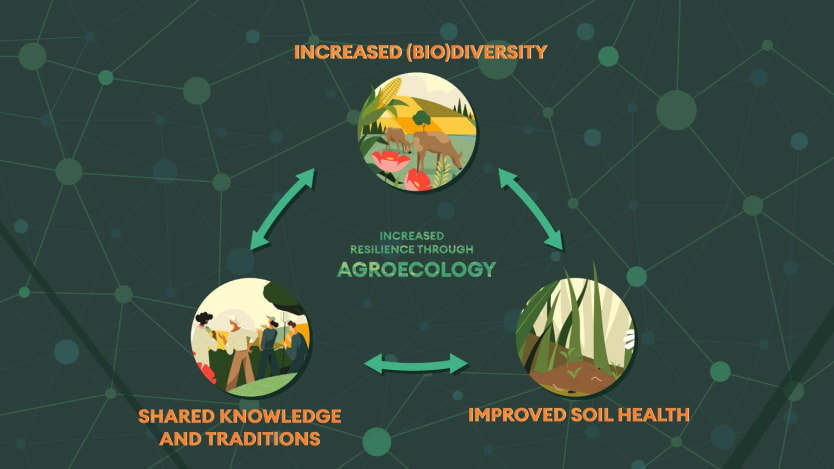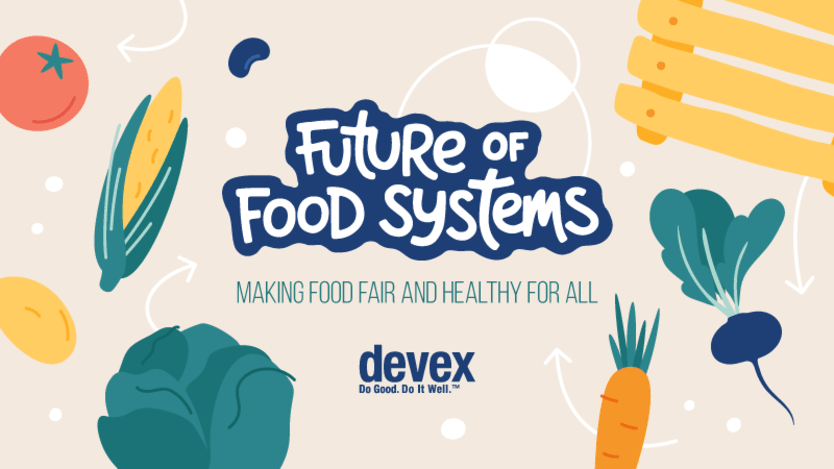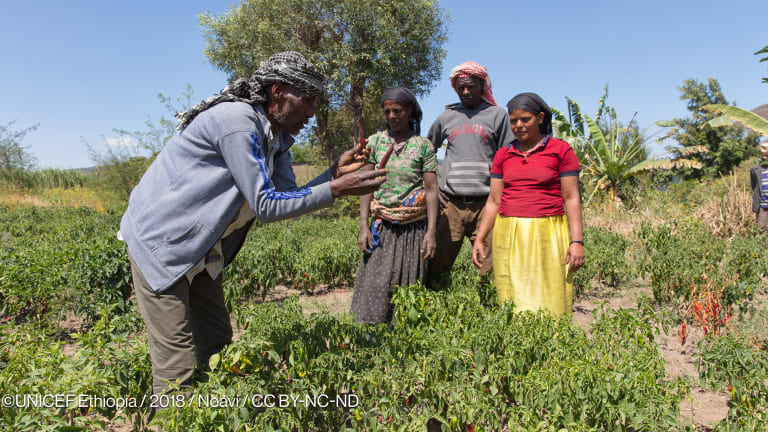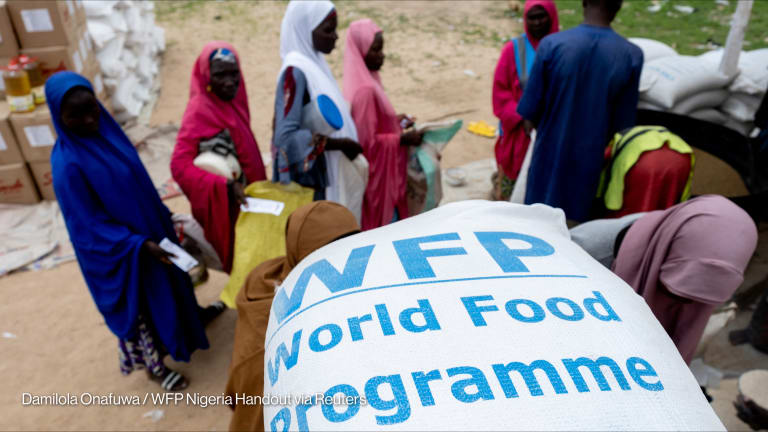Opinion: How agroecology can help food systems be more climate-resilient

Global food security is increasingly under threat. The COVID-19 pandemic has demonstrated how vulnerable our food supply chains are. In the medium term, however, a changing climate, together with dramatic biodiversity loss, is the much bigger challenge.
Agriculture is both villain and victim in the midst of a global climate and biodiversity crisis and we urgently need to transform how we produce food. But how can we foster resilience to increasing external shocks and adapt to changing conditions to support the most vulnerable?
Diversity is our best insurance for resilient food systems
Resilience should be considered from a systemic angle. It can be compared to a spider web: The more nodes and flexible threads that are part of the system, the better it can buffer external shocks. Perhaps we should mimic what nature has proven works best?
Based on field experience and scientific evidence it becomes increasingly clear that agroecology is the best solution. The Food and Agriculture Organization of the United Nations defines 10 agroecological elements and The High Level Panel of Experts gives 13 principles vital to sustainably transform the agriculture sector so it can be more climate-resilient.
A recent study by FAO, Research Institute of Organic Agriculture, or FiBL, and Biovision revealed the strong correlation between the concept of resilience and agroecology, emphasizing three cornerstone aspects of agroecology’s resilience-enhancing potential:
• Diversity creates synergies and redundancies to minimize shocks and reduce complete failures — including species and varietal diversity of animals, plants, fungi, and microbes up to diversity of landscapes, farming practices, and economic diversification.
• Healthy and fertile soils are fostered through agroecological practices, e.g. by nurturing soil biodiversity, closing nutrient cycles, and reducing the input of synthetic fertilizers and pesticides.
• Local farmers and their communities with their knowledge of the terrain, traditions, and heritage, blended with cutting edge scientific knowledge, can bolster resilience.

Climate resilience is best strengthened through a targeted interplay of locally adapted ecologic and socioeconomic measures based on holistic agroecological principles. There is little use in isolated measures only.
It works: Evidence from all over the world
Twenty-seven case studies from across the globe demonstrate how the agroecological approach can work, representing an extensive network of agroecological individuals and initiatives. Three of the case studies from Andhra Pradesh, the Sahel, and the Peruvian Amazon, illustrate initiatives that foster food security and resilience despite the current COVID-19 pandemic.
Learn about the Avaclim project
Fostering uptake of agroecology in arid regions, the project will run from 2020 to 2022. Funded by the Global Environmental Facility and the French Facility for Global Environment, the research component of the project is coordinated by the Institut de Recherche pour le Développement, and supported by a scientific consortium composed of IRD, CARI, CIRAD, Montpellier SupAgro, and local researchers.
Another encouraging example is the Avaclim project, which aspires to create supportive uptake conditions for agroecology in arid regions. The NGO Centre d'Actions et de Réalisations Internationales collaborates with practitioners, farmers, and scientists to conduct a multidimensional evaluation of the impacts of agroecological initiatives in seven countries, advocate for good practice approaches, and for better integration of agroecology into policies and strategies.
The project furthers context-specific knowledge on the potential and challenges of agroecology to scale it up.
The results are first shared among practitioners themselves and then feed science-based policy briefings to political authorities of the partner countries as well as to intergovernmental bodies.
Policy to support an enabling environment
However, sensitization of stakeholders alone will not transform a food system from uniformity and standardization toward diversity and resilience. It is vital to create an enabling policy environment for agroecology that truly levels the playing field for sustainable producers and consumers.
A few governments already provide a favorable policy setting to include agroecological principles. In 2015, the Danish government launched an ambitious plan to double the area under organic cultivation by 2020 and ultimately render Denmark entirely organic. For Bhutan, two key policy goals are to achieve food self-sufficiency and establish a resilient, productive organic farming system, whereas Senegal highlights agroforestry as a key approach in their climate pledge under the Paris Agreement.
Generally, the current revision of the nationally determined contributions by each country to reduce greenhouse gas emissions and adapt to the impacts of climate change presents an opportunity to embark on an agroecology-based transition. Our study revealed that 12.5% of the initial NDCs already mention agroecology either as an adaptation or mitigation strategy, but are proposed as isolated measures rather than as a holistic approach.
In this context, the intergovernmental treaties such as the United Nations Framework Convention on Climate Change and the Committee on World Food Security play a key role. They must provide guidance on how to change from silo approaches to systemic measures and there is great potential to mobilize economic resources through the institutions’ funding mechanisms to finance agroecological initiatives and research.
Changing course toward sustainable food systems
The scientific evidence and cases presented here give hope. But they also highlight the Herculean challenge we still face to protect our food systems from climate change and biodiversity loss.
For a successful transformation, we need to fully embrace complexity, discuss and negotiate trade-offs, and consider the political and economic implications. Remembering the spider web, this means to create and protect as many nodes and threads as possible, connecting the different scales. Locally, farmers should be trained to find context-specific solutions building on agroecological principles.
Part of our The Future of Food Systems series
Find out how we can make food fair and healthy for all. Join the conversation using the hashtag #FoodSystems and visit our The Future of Food Systems page for more coverage.
Nationally, a change of mind among policymakers should promote holistic adaptation and development plans, designed and implemented in a participatory manner. Internationally, discussions in relevant fora must follow a systemic-thinking approach along the Sustainable Development Goals and planetary boundaries.
Such a paradigm shift also implies that current dominant stakeholders and technologies might diminish in power if current intervention strategies are not rethought. However, just as during the COVID-19 pandemic, measures must now focus on the health of people and the planet.
While this is certainly a complex and challenging endeavor, starting by consequently building on diversity, soil health, and shared knowledge, guided by the principles of agroecology, is a viable key strategy that will lead to a better future for all.
Visit the Future of Food Systems series for more coverage on food and nutrition — and importantly, how we can make food fair and healthy for all. You can join the conversation using the hashtag #FoodSystems.

Read more:
• Agriculture at a Crossroads by IAASTD.
• From Uniformity to Diversity by IPES-Food.
• Systemic Challenges, Systemic Responses by TMG.
• Farming with Biodiversity by WWF.
• Agroecology and Climate Change Rapid Evidence Review by CCAFS and FCDO.
Search for articles
Most Read
- 1
- 2
- 3
- 4
- 5










